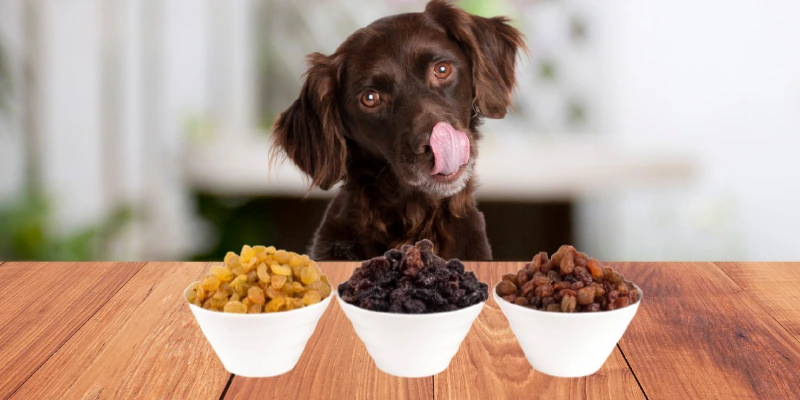Raisins are a common snack enjoyed by many people, often added to baked goods or eaten on their own as a healthy treat. However, if you're wondering whether it's safe to share raisins with your dog, the answer is a resounding no. Raisins are toxic to dogs and can cause serious health issues.
In this article, we’ll discuss why raisins are dangerous for dogs, the symptoms of raisin toxicity, and what to do if your dog accidentally eats raisins.
Why Are Raisins Dangerous for Dogs?
The exact substance in raisins that causes toxicity in dogs is still unknown, but even small amounts can lead to severe health problems. The key points regarding raisin toxicity include:
-
Kidney Failure: Raisins can cause acute kidney failure in dogs. This can occur within hours or days of ingestion, depending on the amount consumed and the individual dog’s sensitivity.
-
Wide Variability: Not all dogs respond to raisins in the same way. Some dogs may experience toxic reactions after consuming just a few raisins, while others may eat larger quantities without immediate signs of distress. This unpredictability makes it critical to avoid giving raisins to dogs altogether.
Symptoms of Raisin Toxicity in Dogs
If a dog ingests raisins or grapes, it's essential to watch for symptoms of toxicity. Common signs may include:
- Vomiting: Often one of the first signs, vomiting may occur within a few hours of ingestion.
- Diarrhea: Diarrhea may follow, sometimes accompanied by blood.
- Lethargy: Affected dogs may appear unusually tired or weak.
- Loss of Appetite: Dogs may refuse food or show little interest in eating.
- Abdominal Pain: Your dog may exhibit signs of discomfort, such as whining or restlessness.
- Increased Thirst and Urination: These can be symptoms of kidney failure.
If you notice any of these symptoms, it’s crucial to seek veterinary attention immediately.
What to Do If Your Dog Eats Raisins
If you suspect that your dog has ingested raisins, follow these steps:
-
Contact Your Veterinarian: Don’t wait for symptoms to develop. Contact your vet immediately for guidance, even if your dog appears fine.
-
Inducing Vomiting: Your vet may recommend inducing vomiting, especially if the ingestion was recent. This can help prevent the absorption of the toxins.
-
Treatment: If your dog shows signs of toxicity or if a significant amount of raisins was consumed, your vet may recommend hospitalization. Treatment may include intravenous fluids, medications to manage symptoms, and monitoring of kidney function.
Preventing Raisin Toxicity
To keep your dog safe, here are some preventive measures:
-
Educate Family and Friends: Make sure everyone in your household knows that raisins and grapes are toxic to dogs and should never be shared.
-
Proper Storage: Store raisins and other potentially harmful foods out of reach of your dog. Consider keeping them in high cabinets or sealed containers.
-
Read Labels: When buying snacks or treats, always check the ingredient list for raisins or grapes, especially in granola bars, trail mixes, and baked goods.
-
Healthy Alternatives: Instead of raisins, opt for safe fruits and vegetables as treats. Apples (without seeds), carrots, and blueberries are excellent choices.
Conclusion
Raisins are toxic to dogs and can lead to severe health issues, including kidney failure. Even small amounts can be dangerous, making it essential to keep raisins out of reach and educate everyone about their potential harm. If your dog accidentally ingests raisins, contact your veterinarian immediately for guidance and potential treatment options.


